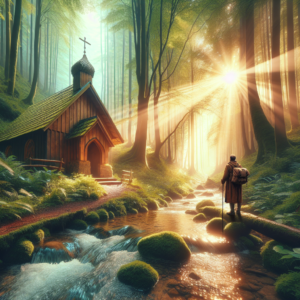In an increasingly complex world where science and spirituality often seem at odds, there exists a sacred opportunity to bridge faith and reason. The intersection of biblical creation and modern science invites us to embark on a journey of exploration and understanding, revealing that these two realms can coexist harmoniously, enriching our worldview rather than diminishing it.
Understanding Biblical Creation
The biblical account of creation, found in the Book of Genesis, presents a narrative where God creates the universe, the earth, and all living beings in a series of purposeful acts. This account conveys a profound message about the nature of existence, instilling a sense of purpose and reminding believers of their intrinsic connection to the Creator. The richness of this narrative lies not only in its theological implications but also in its capacity to inspire awe and reverence for the natural world.
Many people interpret Genesis as a historical and literal account; however, others see it as an allegorical story rich with theological insight. Regardless of perspective, at its core, the message of creation reflects God’s intentional design and the inherent value of all life. This spiritual understanding provides comfort and hope, fostering a sense of belonging in a universe that is often perceived as chaotic and indifferent.
Embracing Modern Scientific Discovery
Modern science, on the other hand, seeks to understand the universe through observation, experimentation, and reasoning. From the Big Bang theory to the theory of evolution, scientific discoveries continue to unveil the intricacies of life and the cosmos. These insights affirm our understanding of a dynamic and ever-changing universe, one that holds mystery and beauty in its unfolding drama.
While some may perceive the advancements of science as a challenge to faith, many scholars and theologians argue that scientific discoveries are merely a means of uncovering the complexity of God’s creation. The laws of physics, biological principles, and astronomical phenomena all point to an intricate design that reflects the brilliance of a Creator. Each discovery does not negate faith but enhances it, unveiling the wonders of God’s handiwork in the natural world.
Finding Common Ground
To bridge faith and reason effectively, it is essential to foster open dialogue between religious and scientific communities. Such conversations can harbor collaborative exploration rather than confrontation. Responsible engagement encourages questions, nurtures curiosity, and creates fertile ground for mutual respect.
One compelling example of this is the work of organizations like the BioLogos Foundation, which promotes the compatibility of evolutionary science with biblical faith. By emphasizing the dialogue between science and Christianity, BioLogos is enriching the perspectives of believers and scientists alike, embracing a holistic approach that appreciates the beauty of creation in both spiritual and scientific terms.
Moreover, many renowned scientists are also people of faith. Figures like Francis Collins, who led the Human Genome Project and serves as the Director of the National Institutes of Health, affirm that faith and science can intertwine to provide a greater understanding of the world around us. Their testimonies help demystify the perception that one must choose between faith and reason, encouraging individuals to pursue both.
Encouragement for the Journey
For individuals grappling with the tension between biblical creation and modern science, it is essential to approach this journey with an open mind and heart. Faith should not be intimidated by scientific inquiry; rather, it should inspire a deeper investigation of creation’s mysteries. Embrace the questions, allow for doubts, and persist on the quest for truth.
Encouragingly, many institutions, churches, and community groups now offer resources, lectures, and discussions that explore the harmony between faith and science. These platforms allow individuals to engage with knowledgeable voices who have wrestled with these issues, providing encouragement and insights for navigating the complexities of a world where faith and reason converge.
Conclusion
The intersection of biblical creation and modern science is not a battleground but a bridge—a pathway that invites us to appreciate the grandeur of existence. As we pursue understanding through both faith and reason, we open ourselves to a more profound relationship with the Creator and a deeper connection with the universe.
This journey offers encouragement that, rather than being at odds, faith and science can complement one another, inspiring a holistic approach to life. We can embrace the mystery of creation, celebrate the discoveries of science, and recognize that both avenues lead us closer to the divine truth that enriches our existence. In this beautiful interplay lies the invitation for all to explore, question, and ultimately, understand the awe-inspiring world we inhabit.
Explore and dig up answers yourself with our BGodInspired Bible Tools! Be careful – each interaction is like a new treasure hunt… you can get lost for hours 🙂


